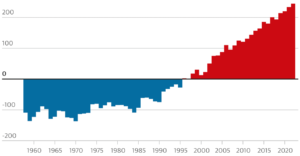
According to analysis, ocean temperatures in 2022 were the highest ever recorded.
In 2022, the world’s oceans experienced their highest temperature ever, demonstrating the profound and pervasive changes in climate caused by human-caused emissions.
The oceans absorb more than 90% of the excess heat trapped by emissions of greenhouse gases. Ocean temperatures have been steadily rising since 1958, with an acceleration after 1990, according to the records.
Sea surface temperatures have a significant impact on global weather. Oceans that are hotter help supercharge extreme weather, resulting in stronger hurricanes, typhoons, and rainstorms as well as more moisture in the air. Additionally, warmer water expands, raising sea levels and posing a threat to coastal cities.
Since the temperature of the oceans is indefinable evidence of global warming because it is much less affected by natural climate variability than the temperature of the atmosphere.
When the final data are compiled, it is anticipated that the previous year was either the fourth or fifth hottest ever recorded for surface air temperatures. The cooler phase of an irregular climate cycle centered on the Pacific that influences global weather patterns occurred during the third La Nia event in a row in 2022. Global air temperatures will rise even further when El Nio returns.
The new ocean heat analysis’s international scientific team came to the following conclusion: “The Earth’s energy and water cycles have been profoundly altered due to the emission of greenhouse gases by human activities, driving pervasive changes in Earth’s climate system.”
A member of the study team and professor at the University of St. Thomas in Minnesota, Prof. John Abraham stated:”If you want to measure global warming, you want to measure where the warming goes, and over 90% goes into the oceans.”
“Measuring the oceans is the most accurate way of determining how out of balance our planet is.”
“We are getting more extreme weather because of the warming oceans and that has tremendous consequences all around the world.”
Additionally a member of the team, Professor Michael Mann at the University of Pennsylvania stated, “Warmer oceans mean there is more potential for bigger precipitation events, like we’ve seen this past year in Europe, Australia, and currently on the west coast of the US.”
According to him, the analysis revealed an expanding layer of warm water at the ocean’s surface: “This leads to greater and more rapid intensification of hurricanes – something we’ve also seen this past year – since the winds no longer churn up cold sub-surface water that would otherwise dampen intensification.”
Ocean heat content in upper 2,000 metres relative to 1981-2010 average (zettajoules)

Source: Cheng et al, Advances in Atmospheric Sciences, 2023
The climate crisis increased the likelihood and intensity of numerous extreme weather events in 2022, according to research released on Monday by the US National Oceanic and Atmospheric Administration. These events included the torrential downpours that wreaked havoc on the ground in Chad, Niger, and Nigeria.
Although accurate measurements of ocean temperature go back to 1940, it is likely that the oceans are currently at their hottest point in 1,000 years and warming at a rate faster than any time in the last 2,000 years.
The study, which was published in the journal Advances in Atmospheric Sciences, combined separate analyses by Chinese and US teams to determine the heat content of the top 2,000 meters, which is where the majority of the heating takes place, using temperature data collected by a variety of instruments across the oceans.
In 2022, the oceans absorbed approximately 10 zettajoules more heat than in 2021. This is equivalent to 40 hairdryers being used continuously by every person on Earth.
The researchers also looked at salinity, which, along with temperature, is a key driver of ocean circulation and determines water density. In 2022, a measure of oceanic salinity variation reached a record high, indicating that the global hydrological cycle is still being accelerated.
The ocean’s stratification, in which water layers become more densely layered, is another important feature. This prevents surface waters from mixing with deeper, cooler, and more nutrient-dense waters.
The researchers discovered that in 2022, the long-term trend of increasing stratification continued, with “important scientific, societal, and ecological consequences.”
According to Abraham, one result is that the ocean’s surface layer absorbs less carbon dioxide from the atmosphere, resulting in an increase in global warming.
Additionally, the researchers stated: “There are increasing occurrences of record-shattering heatwaves and droughts in the northern hemisphere, consistent with intensive ocean warming in the mid-latitude Pacific and Atlantic oceans.”
Until humans reach net zero emissions, the oceans will continue to heat up and have an impact on extreme weather.
The World Meteorological Organization reported in October that all of the major greenhouse gases—carbon dioxide, methane, and nitrous oxide—had reached record levels in the atmosphere. Prof. Petteri Taalas, head of the WMO, said: “We are heading in the wrong direction.”
——————————————————————————
At Natural World Fund, we are passionate about stopping the decline in our wildlife.
The declines in our wildlife is shocking and frightening. Without much more support, many of the animals we know and love will continue in their declines towards extinction.
When you help to restore a patch of degraded land through rewilding to forests, meadows, or wetlands, you have a massive impact on the biodiversity at a local level. You give animals a home and food that they otherwise would not have had, and it has a positive snowball effect for the food chain.
We are convinced that this is much better for the UK than growing lots of fast-growing coniferous trees, solely to remove carbon, that don’t actually help our animals to thrive.
This is why we stand for restoring nature in the UK through responsible rewilding. For us, it is the right thing to do. Let’s do what’s right for nature!
Support our work today at https://naturalworldfund.com/ and join in the solution!

